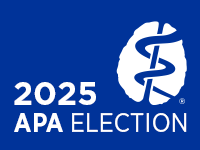As Debate Over Medicaid Cuts Begins, APA Wants Members’ Voices Heard
Later this month, Congress will begin debating a budget reconciliation bill that could propose sweeping funding cuts to health-related programs such as Medicaid. The House of Representatives’ proposed budget includes a directive for the House Energy and Commerce Committee—which oversees Medicare and Medicaid—to reduce spending by $880 billion over the next 10 years as part of goal of $2 trillion in gross deficit reductions.
(The Senate budget requires only $4 billion in gross deficit reductions and allows a $5.8 trillion net deficit increase.)
“We need all hands-on deck to let elected officials know about how devastating these cuts will be to patients,” APA President Ramaswamy Viswanathan, M.D., Dr.MedSc., and APA CEO and Medical Director Marketa M. Wills, M.D., M.B.A., said in a letter to APA membership.
Viswanathan and Wills noted that Medicaid is the single-largest payer for behavioral health services in the United States, the second-largest payer for pediatric care, and a critical source of health insurance for individuals in rural communities.
To help members and other mental health professionals get their voices heard, APA has created a Medicaid Advocacy Toolkit with resources on Medicaid and the budget reconciliation process, tips on how to meet with legislators, and links to other ways to get involved in policy. APA has also initiated a social media campaign—#VoicesForMedicaid—to amplify the message.
For more information about APA’s advocacy efforts and how you can lend your voice, visit APA’s Advocacy Action Center.
(Image: Getty Images/iStock/eric1513)
Don't miss out! To learn about newly posted articles in Psychiatric News, please sign up here.





